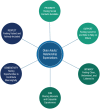Understanding and Addressing Older Adults' Loneliness: The Social Relationship Expectations Framework
- PMID: 36322145
- PMCID: PMC10336618
- DOI: 10.1177/17456916221127218
Understanding and Addressing Older Adults' Loneliness: The Social Relationship Expectations Framework
Abstract
Loneliness is an experience resulting from a perceived discrepancy between expected and actual social relationships. Although this discrepancy is widely considered the "core mechanism" of loneliness, previous research and interventions have not sufficiently addressed what older adults specifically expect from their social relationships. To address this gap and to help situate research on older adults' loneliness within broader life span developmental theories, we propose a theoretical framework that outlines six key social relationship expectations of older adults based on research from psychology, gerontology, and anthropology: availability of social contacts, receiving care and support, intimacy and understanding, enjoyment and shared interests, generativity and contribution, and being respected and valued. We further argue that a complete understanding of loneliness across the life span requires attention to the powerful impacts of contextual factors (e.g., culture, functional limitations, social network changes) on the expression and fulfillment of older adults' universal and age-specific relationship expectations. The proposed Social Relationship Expectations Framework may fruitfully inform future loneliness research and interventions for a heterogeneous aging population.
Keywords: culture; generativity; healthy aging; interventions; personal relationships.
Conflict of interest statement
The author(s) declared that there were no conflicts of interest with respect to the authorship or the publication of this article.
Figures


References
-
- Akhter-Khan S. C., Drewelies J., Wai K. M. (in press). Coping with loneliness in southern Myanmar. Asian Anthropology. 10.1080/1683478X.2022.2115623 - DOI
-
- Akhter-Khan S. C., Tao Q., Ang T. F. A., Itchapurapu I. S., Alosco M. L., Mez J., Piers R. J., Steffens D. C., Au R., Qiu W. Q. (2021). Associations of loneliness with risk of Alzheimer’s disease dementia in the Framingham Heart Study. Alzheimer’s & Dementia, 17(10), 1619–1627. 10.1002/alz.12327 - DOI - PMC - PubMed
Publication types
MeSH terms
LinkOut - more resources
Full Text Sources
Medical
Miscellaneous

